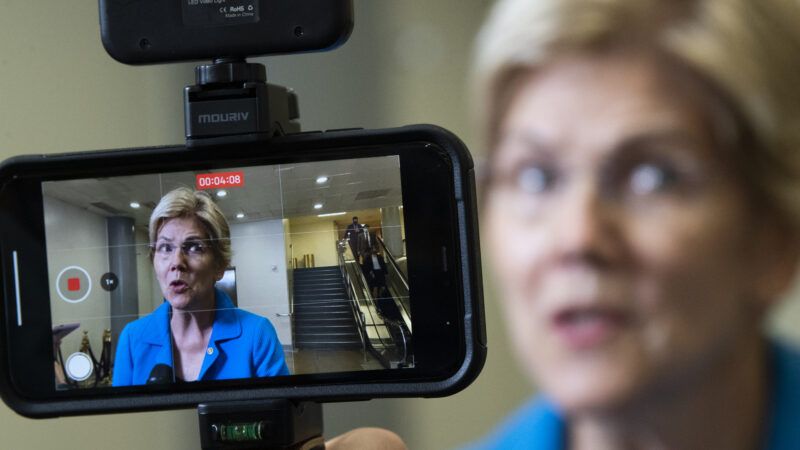Elizabeth Warren Is Trying To Blame Inflation on 'Price Gouging.' Don't Buy It.
Warren's claim that oil companies are jacking up prices to turn a bigger profit doesn't stand up to even the slightest scrutiny.

Looking for someone to blame for high and rising prices at the pump, Sen. Elizabeth Warren (D–Mass.) has found a familiar villain: big corporations.
During an appearance on MSNBC's The ReidOut on Thursday, Warren said price gouging is to blame for the pain that Americans are feeling at the gas pump these days. Amid rising inflation, the average price for a gallon of regular unleaded gasoline sits at $3.40 nationally, up from about $2.11 at this same time last year and higher than at any time since 2014. This, Warren argued, is great news for oil companies and their shareholders.
"Chevron, Exxon have doubled their profits. This isn't about inflation, this is about price gouging for these guys," Warren said as host Joy Reid nodded along. While Republicans are trying to score political points by talking about inflation, Warren says, the "oil companies say 'I think it's just another opportunity to make profits' and we need to call them out on that."
Prices at the pump have gone up. Why? Because giant oil companies like @Chevron and @ExxonMobil enjoy doubling their profits. This isn't about inflation. This is about price gouging for these guys & we need to call them out. pic.twitter.com/kxiQkC2tYa
— Elizabeth Warren (@SenWarren) November 20, 2021
Warren is probably right that successful multinational corporations like oil companies do respond to shifts in the economy by finding ways to turn a profit. Because, well, that's what they have to do to keep being successful multinational companies. There's hardly anything shadowy or suspicious about that. You can put gas in your car this morning because oil companies are making a profit, whether Warren approves or not.
The price-gouging claim, however, is just wildly off base and smacks of political desperation. For months, Democrats claimed that dumping trillions of dollars into the economy during the COVID-19 pandemic—in the form of direct payments, expanded unemployment benefits, and other spending—would not trigger inflation. Then they claimed inflation was transitory. Months later, it now looks like significant inflation will continue well into next year, so a scapegoat must be found.
But Warren's claim that oil companies are jacking up prices to turn a bigger profit doesn't stand up to even the slightest scrutiny.
By their very nature, high prices nudge consumers to buy less than they otherwise would. This is somehow good for the companies that make money by selling things? That's a shortsighted view that only a politician could embrace. Any business operating under the idea that the key to success is screwing over its customers by arbitrarily doubling prices won't be around very long. In Warren's view, Walmart would be more successful if it suddenly doubled the price of everything it sells because that would mean more profit.
It would be helpful to her argument if Warren could point to any evidence of this ever happening, but of course she can't.
There's a less theoretical way to test her claim, too. If Exxon and Chevron had indeed "doubled their profits," as Warren claims, that should translate into a huge boost for their shareholders. You'd expect such a sudden surge in corporate profits to be reflected in their stock prices, right?
But Exxon's stock was trading at about $62 per share on Monday morning. Six months ago, it was trading at…$59.61, according to Google Finance.
Chevron stock is up a bit more over the past six months, but it is still underperforming the market as a whole (the S&P 500 is up more than 12 percent in the past six months):
Where are all those extra profits going? I'm sure Warren would answer by claiming that billionaires are hiding the cash under their gold-encrusted mattresses in the Cayman Islands and that's why the IRS needs the authority to snoop on the bank accounts of Americans earning $600 a year on Etsy—and all that makes about as much sense as blaming inflation on price gouging.
When it comes to assigning blame for any of life's unpleasantries, Warren is like a broken record. Billionaires and corporations, in Warren's view, are responsible for everything from high college costs to the lack of affordable housing to the current supply chain problems. Just as reliably, she ignores the role that government has played in creating or worsening those problems—by subsidizing student loans, imposing restrictive zoning laws, and implementing trade-limiting rules like tariffs and the Jones Act, for example.
The same is true when it comes to gas prices, by the way. Government policies are contributing to inflation already, but Warren was one of several Democrats who backed a carbon tax during the 2020 presidential primaries. Regardless of what merits a carbon tax might have as a way to curb climate change, it is undeniable that it would mean higher prices at the pump.
With inflation suddenly taking center stage in the political discourse, Warren is trotting out the same tired arguments blaming successful businesses for the consequences of failed government policy. There's no reason to believe her.


Show Comments (243)